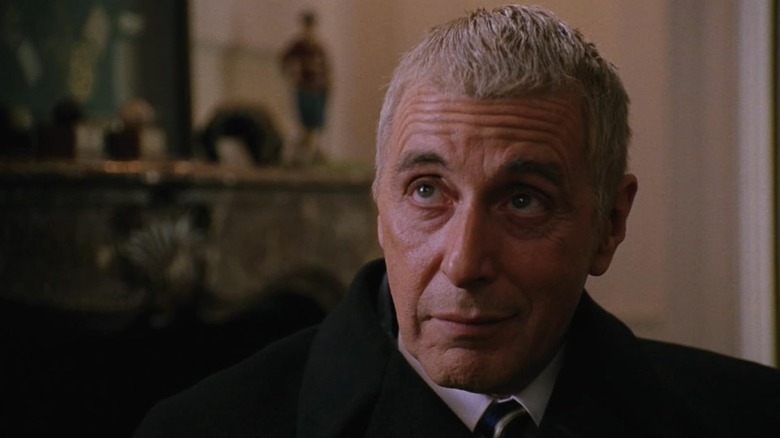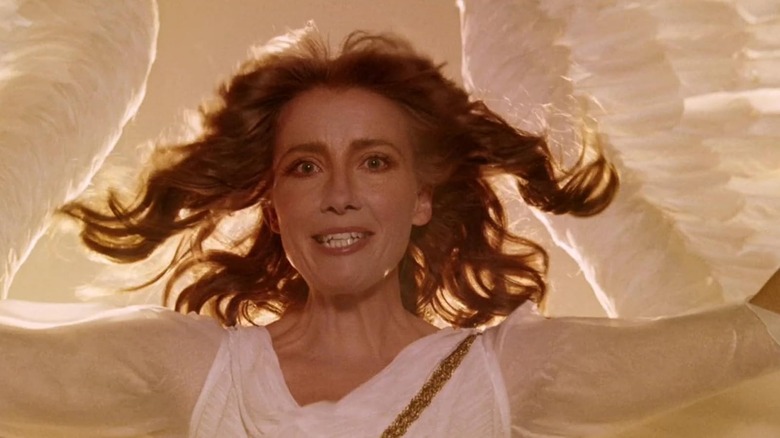Al Pacino's Emmy Record-Breaking Miniseries Is A Must-Watch On HBO Max
In 2004, a Mike Nichols-directed HBO miniseries swept the 56th Primetime Emmy Awards, winning 11 category awards out of 21 nominations. This star-studded endeavor — starring the likes of Al Pacino, Meryl Streep, Emma Thompson, and Jeffrey Wright — was "Angels in America", which also happened to be the most-watched made-for-cable series in 2003. (For those curious, the latest HBO Max equivalent is Jesse Armstrong's satire "Mountainhead.") The series' brilliance stems from its source material, namely Tony Kushner's two-part play of the same name, which won everything from the Pulitzer to the Tony after its 1992 premiere.
Kushner's "Angels in America" is symbolically complex in its examination of queerness, envisioning a world where angels and spirits freely interact with the dizzying extremes of the human spectrum. There's a somber edge to this fantastical story, but Kushner's play is zany, unpredictable, and larger-than-life — all qualities the HBO miniseries adaptation beautifully translates to the small screen. The project undoubtedly benefitted from Kushner's close involvement, as its story remains one of the most powerful portrayals of the AIDS epidemic in the 20th century.
HBO's broadcast schedule also helped to present the series in thrilling, digestible chunks. Indeed, the first three chapters of "Angels in America" aired first, followed by the final three entries. (The miniseries as a whole, like the original play, was split into two halves: "Millennium Approaches" and "Perestroika.") This was a sound strategy, as the sheer scope of the narrative is massive. Nichols' adaptation captures the tense socio-political climate of its setting, including the nuances of Reagan-era politics, along with the daily toils of a dying prophet, a prosecutor, and half a dozen more people living in New York in the mid-1980s.
But what makes this beloved HBO miniseries so special as to warrant such unanimous acclaim? Let's dig deeper into it.
Bringing Angels in America to the small screen was a long, labor-intensive process
Executive producer Cary Brokaw spent more than 10 years bringing Kushner's "Angels in America" to television, which was a lengthy, difficult process. Brokaw saw this project through all its stages of development, from the time Robert Altman was briefly attached to direct in the early 1990s to when Nichols (best known for "The Graduate") was finally recruited to helm the long-gestating production. Kushner was also involved from start to finish, and while he considered settling for a feature film at one point, it soon became clear a single movie could never accommodate the saga's immense breadth and scope.
"Angels in America" doesn't revolve around just one person. There's Prior (Justin Kirk), who tells his lover Louis (Ben Shenkman) that he has AIDS, and the latter leaves, unable to witness such pain. There's also Mormon chief clerk Joe (Patrick Wilson), who is silently struggling with his queerness while being married to Harper (Mary-Louise Parker), where no amount of social masking can soothe Joe's inner turmoil. Meanwhile, Joe's mentor Roy Cohn (Pacino), who has AIDS, is more concerned about public perception, as he's adamant that he's different from other gay men. But besides being deeply personal, these stories also raise existential themes. And oh, Meryl Streep and Emma Thompson both play multiple roles, blending grounded realism with fantasy (again, like in Kushner's play).
These individual (and connected) stories are depressing, riveting, and compelling on their own, but what the miniseries does best is flesh out the thematic subtext of Kushner's play in markedly impressive ways. It's a mythical saga, of course, but also one full of real hope and pathos as it explores love, identity, justice, and truth.
"Angels in America" is currently available to watch on HBO Max.

